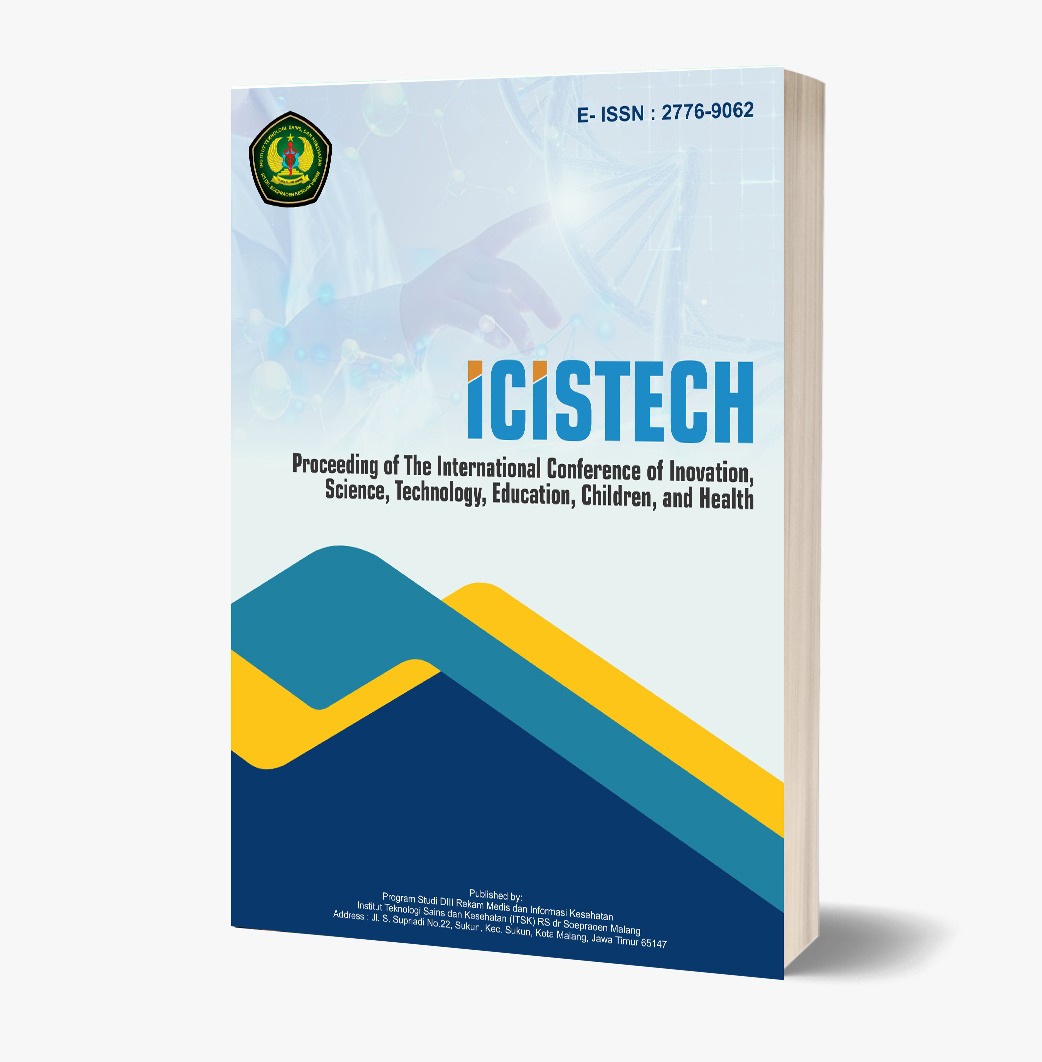The Effect of Smart Parenting Training on Increasing Parental Self-Efficacy of Working Mothers with Toddlers
DOI:
https://doi.org/10.62951/icistech.v3i2.63Keywords:
Toddler, Working Mom, Parental Self-Efficacy, Smart ParentingAbstract
Parental self-efficacy is an important predictor that influences the positive behavior of parents in parenting. This study aims to determine the effect of smart parenting training on increasing parental self-efficacy of working mothers with toddlers. This study used a quasi-experimental design with the untreated control group design with dependent pretest and posttest samples. A total of 14 participants were divided into two groups, namely seven participants in the experimental group and seven participants in the control group. Smart parenting training uses experiential learning models and e-learning video-based methods. Measurements in this study used a short version of the Self-efficacy for Parenting Tasks Index-Toddler Scale (SEPTI-TS). The results of data analysis using the Mann-Whitney U show that there is a significant difference in parental self-efficacy (ρ=0.002) in the experimental group and the control group, and based on the Wilcoxon sign rank test shows that there is an increase in parental self-efficacy in the experimental group (ρ=0.018) after receiving smart parenting training, whereas in the control group participants (ρ=0.680) there was no increase in parental self-efficacy. The results showed that smart parenting training affected increasing parental self-efficacy for working mothers with toddlers.
References
Anderson, O. A. (2006). Linking work stress, parental self-efficacy, ineffective parenting, and youth problem behavior (Doctoral dissertation, University of Tennessee). ProQuest Dissertations and Theses. https://trace.tennessee.edu/cgi/
Antawati, D. I., & Murdiyani, H. (2013). Dinamika psikologis pembentukan parenting self-efficacy pada orangtua penyandang tunarungu yang memiliki anak berpendengaran normal. Jurnal Psikologi Teori Dan Terapan, 4(1), 31–47. https://doi.org/10.26740/jptt.v4n1.p31-47
Bandura, A. (1997). Self-efficacy: The exercise of control. New York, NY: W. H. Freeman and Company.
Bray, T. (2009). The training design manual: The complete practical guide to creating effective and successful training programmes (2nd ed.). London, UK: Kogan Page.
Coleman, P. K., & Karraker, K. H. (1997). Self-efficacy and parenting quality: Findings and future applications. Developmental Review, 18(1), 47–85. https://doi.org/10.1006/drev.1997.0448
Coleman, P. K., & Karraker, K. H. (2003). Maternal self-efficacy beliefs, competence in parenting, and toddlers’ behavior and developmental status. Infant Mental Health Journal, 24(2), 126–148. https://doi.org/10.1002/imhj.10048
Crouter, A. C., & McHale, S. (2005). The long arm of the job revisited: Parenting in dual earner families. In T. Luster & L. Okagaki (Eds.), Parenting: An ecological perspective (2nd ed., pp. 295–316). Mahwah, NJ: Lawrence Erlbaum Associates. https://doi.org/10.4324/9781410613394
Handayani, A., Afiatin, T., & Adiati, M. G. (2015). Studi eksplorasi makna keseimbangan kerja-keluarga pada ibu bekerja. Seminar Psikologi & Kemanusiaan, 2003, 978–979.
Handayani, D. S., Sulastri, A., Mariha, T., & Nurhaeni, N. (2017). Penyimpangan tumbuh kembang pada anak dari orang tua yang bekerja. Jurnal Keperawatan Indonesia, 20(1), 48–55. https://doi.org/10.7454/jki.v20i1.439
Hayati, F., & Febriani, A. (2019). Menjawab tantangan pengasuhan ibu bekerja: Validasi modul “smart parenting” untuk meningkatkan parental self-efficacy. Gadjah Mada Journal of Professional Psychology (GamaJPP), 5(1), 1–14. https://doi.org/10.22146/gamajpp.48582
Holladay, C. L., & Quinones, M. A. (2008). The influence of training focus and trainer characteristics on diversity training effectiveness. Academy of Management Learning & Education, 7(3), 343–354. https://doi.org/10.5465/amle.2008.34251658
Jones, T. L., & Prinz, R. J. (2005). Potential roles of parental self-efficacy in parent and child adjustment: A review. Clinical Psychology Review, 25(3), 341–363. https://doi.org/10.1016/j.cpr.2004.12.004
Khofiannida, I., & Hardjanta, G. (2012). Perbedaan konflik intrapersonal ditinjau dari status pekerjaan pada ibu. Jurnal Psikologi Ilmiah, 4(1), 1–7. http://journal.unnes.ac.id/sju/index.php/intuisi
Kirkpatrick, D. L., & Kirkpatrick, J. D. (2006). Evaluating training programs: The four levels (3rd ed.). San Francisco, CA: Berrett-Koehler Publishers.
Kolb, A. Y., & Kolb, D. A. (2017). Experiential learning theory as a guide for experiential educators in higher education. ELTHE: A Journal for Engaged Educators, 1(1), 7–45. https://nsuworks.nova.edu/elthe/vol1/iss1/7
Korabik, K. (2015). The intersection of gender and work-family guilt. In M. J. Mills (Ed.), Gender and the work-family experience: An intersection of two domains (pp. 127–144). New York, NY: Springer. https://doi.org/10.1007/978-3-319-08891-4_8
Murdiningsih, & Komariah, N. (2019). Knowledge and parenting patterns with toddler’s growth and development. International Journal of Public Health Science (IJPHS), 8(2), 179–184. https://doi.org/10.11591/ijphs.v8i2.17808
Nielsen, M. (2012). Imitation, pretend play, and childhood: Essential elements in the evolution of human culture. Journal of Comparative Psychology, 126(2), 170–181. https://doi.org/10.1037/a0025168
Noe, R. A. (2017). Employee training and development (7th ed.). New York, NY: McGraw-Hill Education.
Oktavianto, E., Lesmana, T. W. I., Timiyatun, E., & Badi’ah, A. (2019). Pelatihan bermain pada pengasuh meningkatkan parenting self-efficacy. Jurnal Keperawatan Respati Yogyakarta, 6(1), 523. https://doi.org/10.35842/jkry.v6i1.294
Rahmawati, R. A., & Ratnaningsih, I. Z. (2018). Hubungan antara parenting self-efficacy dan konflik pekerjaan-keluarga pada ibu bekerja yang memiliki anak usia sekolah dasar di PT. “X” Cirebon. Jurnal Empati, 7(2), 174–181.
Rahmawati, R. A., & Ratnaningsih, I. Z. (2018). Hubungan antara parenting self-efficacy dan konflik pekerjaan-keluarga pada ibu bekerja yang memiliki anak usia sekolah dasar di PT. “X” Cirebon. Jurnal Empati, 7(2), 174–181.
Sigelman, C. K., & Rider, E. A. (2018). Life-span human development (9th ed.). Boston, MA: Cengage Learning.
Singh, L. K. (2019). Impact of working mothers on their children’s development. Innovation The Research Concept, 3(3), 18–21.
Tomczewski, D. K. (2009). Predictors of anticipated parenting efficacy in younger adults (Master's thesis, West Virginia University). https://researchrepository.wvu.edu/etd/2786
Van Rijen, E. H. M., Gasanova, N., B., & Huijding, J. (2014). Psychometric qualities of the short form of the self-efficacy for parenting tasks index-toddler scale. Child Psychiatry and Human Development, 45(4), 443–455. https://doi.org/10.1007/s10578-013-0414-6
Downloads
Published
How to Cite
Issue
Section
License
Copyright (c) 2023 Proceeding of The International Conference of Inovation, Science, Technology, Education, Children, and Health

This work is licensed under a Creative Commons Attribution-ShareAlike 4.0 International License.













